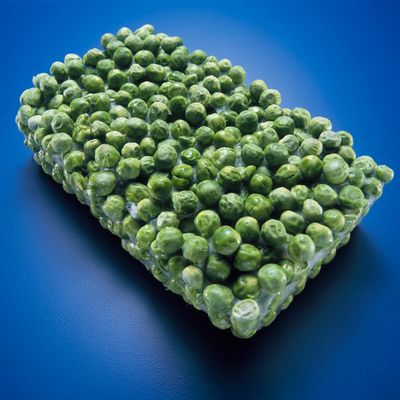
Egg freezing is slowly becoming mainstream. From a medical standpoint, it’s no longer considered experimental. Tech companies are starting to offer it as a perk. And cryopreservation banks even throw “egg-freezing parties” to convince women that it’s a smart way to extend their childbearing windows.
But whether you work for an Apple or a Facebook, who will cover the $10,000 cost, or not, it’s important for women who want to freeze their eggs to remember that the age at which you do “stop time” doesn’t exist in a vacuum — the age of your eggs will affect your chances of actually having a baby. If you want to put some follicles on ice, at what point is it a waste of money? It might be later than you think.
Some backstory: When the American Society for Reproductive Medicine (ASRM) gave egg-freezing the thumbs-up in 2012, they were talking about it specifically as a treatment for infertility. Doctors were seeing solid pregnancy success rates using eggs that were flash-frozen, which was great news for, say, a woman who was facing cancer treatment that might destroy her eggs.
But the ASRM was cautious to say that they did not endorse so-called elective egg freezing for people who weren’t infertile but just wanted an insurance policy for the future. They didn’t want to encourage the freezing of eggs that would never get used, and they worried about giving older woman a false (and expensive) sense of security.
That doesn’t mean doctors don’t do elective egg-freezing; they just have long conversations with their patients. “Elective egg freezing is a reasonable thing, but you have to be careful because some people might jump into doing it who don’t really need it, and for some people it might be too late,” says Owen Davis, MD, current ASRM president and associate director of the IVF Program at the Ronald O. Perelman and Claudia Cohen Center for Reproductive Medicine at Weill Cornell Medical College in New York City.
If a single woman freezes her eggs in her early 30s, she might feel some peace of mind, but it’s still possible that she’ll meet a partner and have no problem getting pregnant the old-fashioned way. But if a woman in her early 40s gets cryopreservation, her chances of having a baby might be much lower than she thinks, thanks to the declining quality of women’s eggs as they get older.
When reproductive endocrinologist Anne Steiner has this conversation with women at the UNC Fertility Clinic, she has a pretty helpful tool to consult: a study she published last year in the journal Fertility and Sterility on the optimal timing for elective egg freezing.
For the paper, she and a team used mathematical modeling to analyze hypothetical women ages 25 to 40 who either did or didn’t freeze their eggs, comparing pregnancy success rates against the likelihood that women would actually use their eggs.
When they strictly compared women of different ages who had frozen their eggs, women who iced before they turned 34 had the best chance of giving birth, says Dr. Steiner, who’s also an assistant professor of obstetrics and gynecology at the UNC School of Medicine. But there was little benefit to women freezing in their 20s versus doing nothing, because they probably weren’t going to use them. So the range that maximizes your baby chances without “wasting” a large sum of money on eggs you might never use is between 30 and 34. (The study assumed women were trying for one baby, so certainly, unused eggs could be thawed in the future for subsequent children.)
Here’s where it gets even more interesting: When Dr. Steiner’s team looked at women who froze their eggs versus women who did nothing, they saw that women who did it at age 37 had the biggest benefit. That’s where they saw the greatest difference in the probability of having a baby, she says. But it needs a caveat.
“There is this benefit over not freezing even at 37, 38, 39, albeit then your chance of getting a baby out of that are much less than if you had frozen at a younger age,” says Dr. Steiner. While it’s not a fail-safe, it is at least reassuring that women over 35 who are thinking about egg freezing are not too late.
She says the study serves as an education tool. “Our goal is to help the woman make the decision by asking herself, ‘do I want to spend this money understanding this is my probability if I do this or if I don’t do this.’”
Dr. Davis thinks it’s helpful as an answer to the question: since this technology exists, should every woman with the means to do so freeze her eggs? “In terms of the cost-benefit analysis, it probably doesn’t make sense for every 20-year-old to freeze their eggs,” he says. “Similarly, a person over 40 is going to have a harder time expecting those eggs to work for her.”
“And at 37, that’s sort of like the average age of the IVF patient in my clinic. That’s actually an age at which you might get a reasonable number of eggs that are reasonably healthy.”
In her experience, Dr. Steiner says younger women aren’t making appointments to ask about this. “Most people aren’t coming in at 20 and saying ‘what age should I do it?’ They’re coming in [later] when they hear about it, think about it, or it crosses their mind. That’s where it’s nice to pull it out and say, ‘Look, this is what you can anticipate to the best of our knowledge,’” she says.
“It’s good, too, because there was a lot of debate about [elective egg freezing] for a long time because of this concern that women would perceive it as something they could 100 percent rely on in the future. It’s not perfect.”




